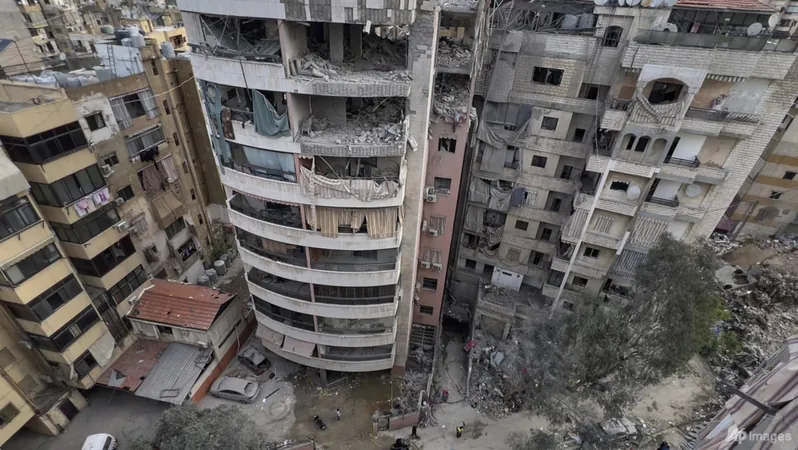
Tragedy Strikes Beirut as Israeli Airstrike Claims Lives During Eid al-Fitr
2025-04-01
Author: Li
BEIRUT—A devastating airstrike conducted by Israel early Tuesday morning has claimed the lives of at least three individuals and injured seven others, marking another violent breach of a fragile ceasefire between Israel and Hezbollah. The attack occurred around 3:30 AM local time, coinciding with the revered Eid al-Fitr holiday, underscoring the strike's tragic timing.
The assault targeted a residential area in southern Beirut, a stronghold for the militant group Hezbollah, and represents Israel's second strike on the Lebanese capital in under a week. Just days prior, Israel had issued an evacuation warning for the region following a similar operation that was a response to rocket fire attributed to Hezbollah. The Israeli military claims that this latest strike was aimed at eliminating a Hezbollah operative accused of coordinating with Hamas to execute an imminent attack against Israeli civilians.
Ground Report: Horror and Destruction
Eyewitness accounts detail scenes of chaos, with rescue teams working tirelessly amid the rubble of a multi-story building heavily damaged by the airstrike. Local health officials reported the grim toll: three lives lost and several individuals rushed to hospitals with injuries. The aftermath has left many residents alarmed, prompting a wave of panic as people fled from their homes.
Lebanon's President, Joseph Aoun, has condemned the attack vehemently, calling for international support for Lebanon’s sovereignty. In a similar vein, Prime Minister Nawaf Salam labeled the action a "clear breach" of the ongoing ceasefire that had largely quelled hostilities for several months.
Escalating Tensions
The Israeli military defended its operation, stating that it acted to eliminate a threat that jeopardized Israeli civilian lives. Prime Minister Benjamin Netanyahu has emphasized that the Israeli Defense Forces will target any entity that threatens national security, indicating a broader strategy to respond decisively to perceived threats from Hezbollah and other militant factions operating in Lebanon.
The cycle of violence escalated dramatically in October 2023, when Hezbollah began launching rockets into Israeli territory following a shocking attack by Hamas, which prompted a devastating retaliation in the Gaza Strip. Lebanon's political landscape remains tense, with Hezbollah leader Naim Qassem urging an immediate cessation of Israeli strikes.
“Enough is enough. This aggression must end now. We cannot allow this conflict to continue to unravel,” Qassem stated in a recent televised address, reflecting the frustrations of a nation beleaguered by ongoing hostilities.
Ceasefire on Shaky Ground
The current ceasefire, established after more than a year of conflict, mandated the withdrawal of Israeli troops from Lebanon by February 18, alongside the disarmament of Hezbollah forces in southern areas close to the Israeli border. However, Israeli officials assert that Hezbollah has failed to comply, with military operations continuing in response to rocket activities from Lebanon.
As tensions mount, Lebanon’s government faces mounting pressure to rein in militant factions. Israeli Defense Minister Israel Katz has placed responsibility for any hostile actions squarely on the Lebanese government, warning that Israel may take unilateral action if the ceasefire continues to falter.
In light of the latest developments, the Lebanese military has ramped up its operations, reportedly apprehending suspects linked to recent rocket launches aimed at Israel. As the situation remains fluid, the international community watches closely, hoping for a resolution to the hostilities that threaten regional stability.
This latest incident is a stark reminder that peace in the region hangs by a thread, with the lives of innocent civilians caught in the crossfire of political and military strife. In an era where the stakes could not be higher, calls for diplomatic intervention grow louder.

 Brasil (PT)
Brasil (PT)
 Canada (EN)
Canada (EN)
 Chile (ES)
Chile (ES)
 Česko (CS)
Česko (CS)
 대한민국 (KO)
대한민국 (KO)
 España (ES)
España (ES)
 France (FR)
France (FR)
 Hong Kong (EN)
Hong Kong (EN)
 Italia (IT)
Italia (IT)
 日本 (JA)
日本 (JA)
 Magyarország (HU)
Magyarország (HU)
 Norge (NO)
Norge (NO)
 Polska (PL)
Polska (PL)
 Schweiz (DE)
Schweiz (DE)
 Singapore (EN)
Singapore (EN)
 Sverige (SV)
Sverige (SV)
 Suomi (FI)
Suomi (FI)
 Türkiye (TR)
Türkiye (TR)
 الإمارات العربية المتحدة (AR)
الإمارات العربية المتحدة (AR)